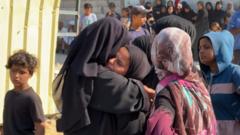As tensions continue in the region, Jordan and the UAE conducted air drops of essential supplies into Gaza after Israel's declaration of a "tactical pause" in its military operations. This pause aims to alleviate the dire humanitarian situation faced by civilians in the enclave.
Aid Drops Arrive in Gaza as Israel Implements Tactical Pause in Conflict

Aid Drops Arrive in Gaza as Israel Implements Tactical Pause in Conflict
Jordan and the UAE step up humanitarian efforts by delivering aid to Gaza amid renewed fighting that has worsened the local humanitarian crisis.
Jordan's military reported that its aircraft, in coordination with the UAE, successfully delivered 25 tonnes of aid during three separate drops on Sunday. Additionally, a convoy of trucks entered from Egypt, with more aid expected from Jordan. Israel announced a temporary halt to military activities for 10 hours daily in certain areas of Gaza, establishing corridors for humanitarian aid as a means to counter accusations of intentionally starving the local population.
Despite these efforts, medics reported that nine individuals were killed and 54 injured by Israeli fire near an established aid route in central Gaza, highlighting ongoing dangers in the area. Witness accounts indicated that victims were targeted while congregating in anticipation of incoming UN aid, and an Israeli airstrike occurred shortly after the pause was initiated.
With reports of desperate civilians scrambling for aid, the World Food Programme highlighted that approximately one-third of Gaza's two million residents face severe food shortages. Moreover, hundreds of deaths due to malnutrition have been reported, with additional casualties arising from gunfire near distribution points established by humanitarian organizations.
International leaders, including the UK's foreign secretary, have called for further actions beyond the recent measures to ensure sustainable and safe avenues for aid delivery. Criticism has also come from the UN high commissioner for human rights, urging global pressure to resolve the conflict, which has escalated into further humanitarian distress.
Amid cautious optimism from residents of Gaza regarding the temporary measures, many are skeptical about the sustainability of aid and continue to face food scarcity. Israeli Prime Minister Benjamin Netanyahu, while acknowledging the aid efforts, reiterated that military operations would persist until their objectives are achieved.
Under the newly implemented measures, designated areas in Gaza will see a pause in fighting from 10:00 to 20:00 local time, with humanitarian corridors open for aid from 06:00 to 23:00. However, concerns remain high about the significant challenges that persist, as residents question whether the tactical pause will ultimately alleviate their prolonged suffering in the wake of a conflict that has escalated since the Hamas-led attack on southern Israel on October 7th, resulting in extensive casualties.
Despite these efforts, medics reported that nine individuals were killed and 54 injured by Israeli fire near an established aid route in central Gaza, highlighting ongoing dangers in the area. Witness accounts indicated that victims were targeted while congregating in anticipation of incoming UN aid, and an Israeli airstrike occurred shortly after the pause was initiated.
With reports of desperate civilians scrambling for aid, the World Food Programme highlighted that approximately one-third of Gaza's two million residents face severe food shortages. Moreover, hundreds of deaths due to malnutrition have been reported, with additional casualties arising from gunfire near distribution points established by humanitarian organizations.
International leaders, including the UK's foreign secretary, have called for further actions beyond the recent measures to ensure sustainable and safe avenues for aid delivery. Criticism has also come from the UN high commissioner for human rights, urging global pressure to resolve the conflict, which has escalated into further humanitarian distress.
Amid cautious optimism from residents of Gaza regarding the temporary measures, many are skeptical about the sustainability of aid and continue to face food scarcity. Israeli Prime Minister Benjamin Netanyahu, while acknowledging the aid efforts, reiterated that military operations would persist until their objectives are achieved.
Under the newly implemented measures, designated areas in Gaza will see a pause in fighting from 10:00 to 20:00 local time, with humanitarian corridors open for aid from 06:00 to 23:00. However, concerns remain high about the significant challenges that persist, as residents question whether the tactical pause will ultimately alleviate their prolonged suffering in the wake of a conflict that has escalated since the Hamas-led attack on southern Israel on October 7th, resulting in extensive casualties.



















